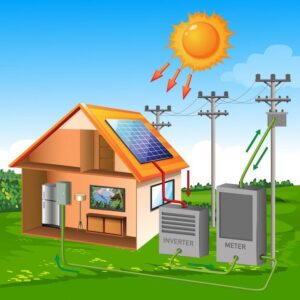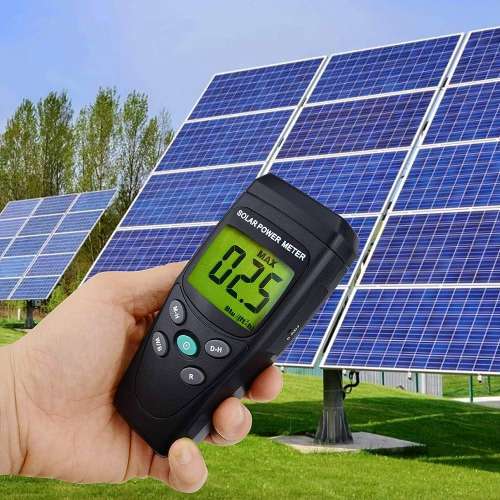Last Updated on October 22, 2023 by Kevin Chen
Image source Freepik
Solar power systems are designed to convert energy from the sun and convert it into electric energy. However, in some applications, they convert this energy into heat-talk of the solar heaters such as solar water heaters. A common feature of all solar power systems is the solar panels. They are designed to trap the energy from the sun and convert it into a targeted energy form; whether it is heat or electricity.
Various electronic components are used in the overall functioning of solar power systems. Among them are the transistors. These tiny semiconductor components are used for controlling the flow of electric current and voltage in electric circuits. They are also used for the amplification of electric signals. Their physical design and electric properties make them relevant in their respective application areas.
What do transistors do in solar power systems and what are their specific roles? Keep reading as we break down all these details.
Transistors in solar panels
The importance of transistors is seen at the very first point of the solar power system, which is the solar panels. They are used to optimize the energy-trapping capability of the solar panels. This is done by the maximum power point tracker (MPPT), which is an electronic device that is responsible for the DC to DC power conversion. It ensures that there is a maximum conversion of power between the panels and the batteries that are responsible for storing the solar energy. The tracker also facilitates the conversion of the high DC voltage output to a lower voltage that is needed to be stored in the batteries.
The MPPT working mechanism is based on the operation of the integrated circuits which are embedded with transistors. The function of transistors in the MPPT is to control the flow of the electric current. By doing so, they minimize any possibility of power loss hence energy optimization.
Transistors in inverters
This is another important role of transistors in solar power systems. They are heavily featured in the inverters whereby they are used for the conversion of the DC power that is generated by the solar panels into AC power which is in usable form by the electric devices and appliances. Which type of transistor is used in inverters and what are the roles of the transistors in the inverters?
The bipolar junction transistor (BJT) is the most preferred transistor type for the solar power inverters. It has desirable switching properties that allow it to perform the role of power conversion perfectly. For precise results, insulated gate bipolar transistors IGBT seem to be a perfect fit for this job. This is because of their high current-carrying capacities.
So, what do transistors do in solar power inverters? Their main function is to facilitate the conversion of electric energy from one form to another. They also control or regulate the flow of electric current into the inverter.
Transistors in solar charge controllers
Charging is another critical element of the solar power system and it is also an areas where transistors are heavily used. There are specialized charge controllers that control the charging process of the solar batteries. They serve as a bridge between the solar panels and the battery such that the current is designed to flow from the solar panels to the battery.
So, what is the importance of transistors in the charge controllers? First, the transistors ensure that the current flows in a desired direction: From the panels to the battery pack. This also helps to prevent the discharge of the battery.
Transistors are also used in charge controllers to regulate the voltage and current that is getting into the batteries. This is an important feature that protects the battery from overcharging, something that is likely to damage the battery cells.
Synchronize with the grid system
There are applications in which solar power systems are used in tandem with other power sources such as the grid connection. In such applications, the solar power system may be used as a backup energy source. Transistors play different roles in the synchronization of the two power systems.
When integrated with the grid systems, transistors receive signals and amplify them for processing and execution. For example, the signals may indicate that there is no power in the main grid meaning that the solar power should take over. It is through amplification that such signals will be executed. At the same time, the transistors will send signals when the normal grid is back so that the system will stop using energy from the solar power system.
Still, on the matters of integration, transistors play an important role in integrating solar power systems to other vital components. One such component is the digital user interface that allows you to monitor the performance of the system even from remote locations. Transistors that are embedded into the integrated circuits make such integrations and connections possible.
Image of solar power digital meter source Amazon
Protection and regulation
Transistors play protective roles in the solar power systems. One way of achieving this is by acting s voltage and current regulators. They ensure that only the required voltage or current is able to flow through certain devices in electric circuits. Just in the same way that they protect batteries from overcharging, they also protect electric appliances from excess current that is flowing from the solar power batteries.
Conclusion
Are you building a solar power systems solution? You will need to bring together all the important electronic components that will make the system work. As we have seen, transistors are among the essential components that you will need for your solar power system to work perfectly. Find out the type of transistor and its power specifications. From there, you can proceed to find out the quality of the transistors.
The best way of dealing with this issue is by choosing a reputable and reliable transistor supplier in China. This way, you will be sure to end up with high-quality transistors for sale. In case you need any advice, it will be vital to consult solar power system experts for detailed and accurate advice.
If you want to find more Electronic Components Distributors, please check out the following articles:
Electronic Components Distributors In the USA
Electronic Components Distributors In UK
Electronic Components Distributors In China
Electronic Components Distributors In India
Electronic Components Distributors In Singapore
Electronic Components Distributors In Malaysia
Electronic Components Distributors In Vietnam
Electronic Components Distributors In South Korea
- The Ultimate Guide to IRFZ44N MOSFET - April 30, 2024
- AMD Ryzen 5 vs Intel i5: How to Choose the Right Processor? - April 30, 2024
- Where to buy IC chips? The Best Guide? - March 26, 2024






